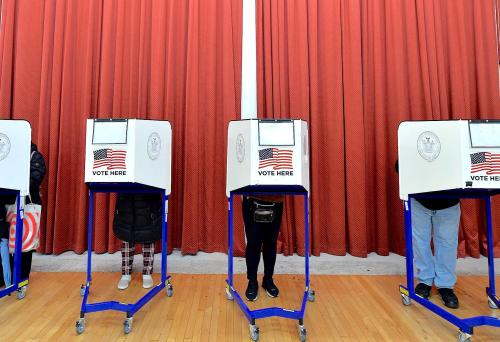No major political party at any point in history existed without division. Different factions within each party have caused headaches for party leaders and, without fail, require presidential candidates to walk a fine line at their conventions. This year is no different. For Republicans, the past ten days have brought such division to the fore and have made Governor Romney’s task even more precarious.
Congressman Todd Akin’s offensive comments regarding sexual assault, conception, and abortion were in many ways outside of the mainstream of even Republican Party ideology. But, in other ways—the idea that abortion should be illegal in all cases, including rape and incest—expressed views that have measurable support, (~20% in the latest Gallup poll) and have become part of this year’s draft Republican platform. In fact, the division over abortion exceptions not only pits Republican voters against their partisan brothers (and sisters), but illustrates a divide among the two people running on the GOP ticket.
The abortion issue aside, Republicans (and Democrats, too) support controversial issues that spark deep divisions in the American electorate. These include a restructuring of Medicare, tax cuts even for the wealthiest of Americans, and opposition to civil unions—much of which is contained in the draft Republican Party platform. These issue positions appeal strongly to the most vocal, motivated, active, and energized voters in the Republican Party, and Governor Romney’s election-week ground game will require continued activism from these voters to be successful. However, Romney also needs to appeal to moderate, working class voters who have lost favor for the president, but who also hold beliefs that differ dramatically from Republican activists.
So, what can a candidate do? Romney must be careful to ensure the words spoken from the dais in Tampa reach the ears of the appropriate listeners, capitalizing on the limited network coverage of speaking slots. Parties may lament that network coverage of conventions shortens each year, harming a thriving democracy by limiting voter access to the party gala. Believe none of it. Parties—Democratic and Republican, alike—embrace the fact that the major networks don’t cover speakers from lunch to dinner. It is during this time the ideological and activist voices have their time to shine, and are out of (live) view of most American voters. Surely, 24-hour news channels like CNN, MSNBC and Fox News may broadcast it live, but many voters who are too busy for or too tired of continuous political news will see none of it. They may only tune in to hear a candidate speak or the “big name” or watch a fresh face, like New Jersey Governor Chris Christie, give a keynote, missing parties’ unabashed ideologues.
The activists and the Tea Party faithful will speak in Tampa, but the structure of coverage almost ensures that the viewers who watch these speeches are core voters who have decided far in advance they will cast a ballot for Romney. Todd Akin will not speak or even attend the convention, but the Todd Akins of the party will be there. They won’t spout outlandish claims about innate pregnancy prevention or the semantics of rape, but they will be steadfast in support for pro-life policies in the same ways Akin and kin have done for generations. They will do this to stir up the base, ensure the checks keep flowing to Republicans, and keep values voters motivated for a candidate about whom they have been skeptical. And this will all be done with low visibility mid-day convention speeches.
When the cameras from ABC, NBC, and CBS fire up, the lineup of speakers and the tone and content of the rhetoric will change. Marco Rubio will not speak about abortion. Paul Ryan will not discuss gay marriage. Condoleeza Rice will not harangue the socialists in the opposite party. They—and their party’s standardbearer—will focus on President Obama’s greatest vulnerability: a sluggish economy, a failed recovery, widespread unemployment, and the need for a president who can do better.
In the past, primetime Republican Convention speakers have had more freedom to wade into social issues, as they had politics and polling on their side. This year, however, such a proposition is riskier. In fact, with a nominee who disagrees (or has disagreed in the past) with social planks on this year’s party platform, avoiding those issues will help gloss over deep and impassioned divisions within the GOP (and between the party and the center). A task for both parties is to appeal to the necessary voters in the right states.
The Republicans will put forward a battery of speakers that show the racial, ethnic, religious, and age diversity within the party. Yet, diversity is a less important issue. They will direct to the dais candidates for competitive, down-ballot races. Yet, the down ballot is a less important issue. Instead, Romney and the major speakers at the convention will join hands and speak strongly about the issue the former Massachusetts Governor wants to be front and center, the biggest issue on the minds of swing voters, and the issue that unites a fractured party: the economy. Romney wants to put aside a congressman’s stupid comments and remind everyone it’s the economy, stupid.
The Brookings Institution is committed to quality, independence, and impact.
We are supported by a diverse array of funders. In line with our values and policies, each Brookings publication represents the sole views of its author(s).


Commentary
Missouri Loves Company: Romney’s Tightrope Act at the GOP Convention
August 27, 2012